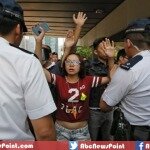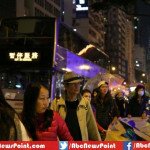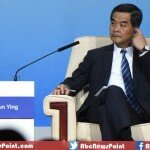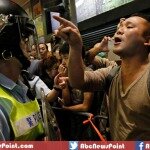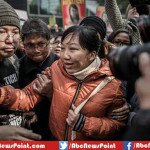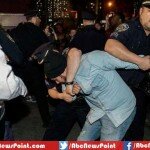Hong Kong: Start Dismantling Barricades Protesters After Court Order
Bailiffs were dismantling barricades Tuesday in Hong Kong, performing a first court decision to reduce the scope of the sites occupied by the pro-democracy demonstrators in the former British colony.
The dozen demonstrators were present no resistance to the workers who were working to dismantle the barricades placed around the Citic Tower, a skyscraper of 33 floors located at the edge of the main occupation site at Admiralty, near the seat of power.
Of bailiffs and police dozens were present. An argument broke out when workers dismantled barriers erected on a roundabout near the protesters felt that the area was not affected by the deportation order.
The demonstrators, who are demanding the establishment of a genuine universal suffrage, took to the streets by the tens of thousands since September 28. Their number has decreased significantly since then, but they still occupy three sites in the former British colony, seriously disrupting public transport and economic activity.
Different owners or carriers seek court orders dispersion in some places occupied as Admiralty or Mong Kok in mainland Hong Kong.
The High Court has allowed it a few days ago the police to help bailiffs to execute such orders. The High Court also requested that each deportation order be published in the local press before being implemented, what was done to the Citic Tower Saturday. The ordinance in question concerned the immediate vicinity of the tower, not the four two-lane occupied by protesters in Admiralty where hundreds of tents were still present.
A new order dispersion on Mong Kok this time was published on Tuesday, paving the way for a similar dismantling operation.
The protesters said they would go elsewhere. “I’m not going to stop” to remove the barricades, said Max Cheng, 25 years. “The movement does not need to take place here.”
Chinese territory enjoying a degree of autonomy, the former British colony is experiencing its worst political crisis since its return to Beijing in 1997.
Beijing approved the principle of “one person, one vote” but reserved a committee of electors largely favorable to the Chinese Communist Party care of screening, conditions deemed unacceptable by the pro-democracy movement.
Protesters begin to lose the support of public opinion, tired of traffic jams and disturbances. In a survey conducted between 5 and 11 November by the Chinese University of Hong Kong, 67% of respondents felt that the protesters were back home. This is the first time a majority of respondents say they are opposed to the movement since September.








